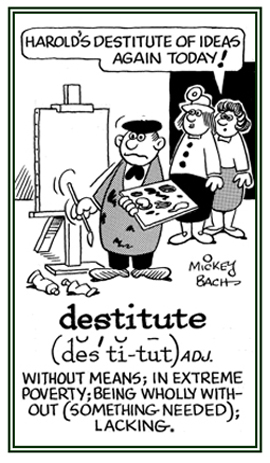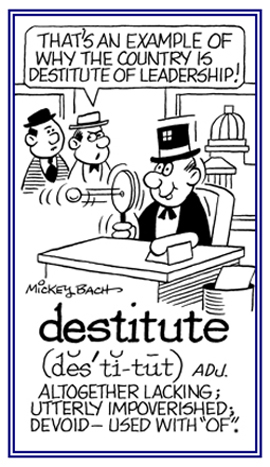stato-, stat-, sta-, -static, -stasi, staso-, -stasis, -stasia, -stacy, -stitute, -stitution, -sist
(Latin: standing, to stay, to make firm, fixed; cause to stand, to put, to place, to put in place, to remain in place; to stand still)


Go to this Word A Day Revisited Index
so you can see more of Mickey Bach's cartoons.
2. The expanse between two things when they are far apart from one another: Jim wondered if the distance from his house to the lake was too far to walk.
3. The uninvolved relationship between two people or things: Even though the two students knew each other for a long time, there was still an emotional distance between them that was felt by the others in the group.
4. Farawayness of an object, place, person, or animal: Finally Raymond could perceive the mountain goat in the distance when climbing up the slope.
5. Aloofness, coolness, or unfriendliness of a person's behavior: Valerie turned away from Adam with noticeable distance and stiffness when they accidentally met in the store.
2. Characteristizing an event or a time that lies in the past or in the future: Aunt Jane still had distant memories of her children when they were babies.
3. Referring to a remote relative: Mrs. Thompson said she had a distant aunt and uncle who lived somewhere in Germany.
4. Concerning a person who is withdrawn, cool, or reserved: Gary could hardly start a conversation with his colleague because she was so distant, stiff, cold, and unapproachable.
5. Pertaining to an individual who is abstracted, faraway, or unaware: Mrs. Smith, Tim's teacher, noticed that he seemed to be preoccupied, inattentive, and distant, and wasn't concentrating on his work in class.
2. Pertaining to how a person perceives something: While Jack was telling Anita about his trip to Canada in the past, she distantly recalled the photos he had shown her back then.
3. Relating to how an individual does or says something in an unemotional or uninvolved way: "Have a nice time on your journey," the taxi driver said politely, but distantly, while his passengers were getting off at the airport.
2. A state of emotion intense and exalting: When Bob finally met his long-lost love at the airport, he fell into total ecstasy with overwhelming emotions and was in a state of total bliss!
3. The trance or rapture of a mystic or prophetic exaltation: In some denominations, the congregation might be carried away by overwhelming emotions and ecstasy.
4.A medical state in which the body displays an interruption of voluntary motion, mental power, and sensibility: While in a condition of ecstasy, the person is in an erect and inflexible position, while breathing and pulsation are not affected at all.
5. Etymology: from Old French extasie and Late Latin extasis, from Greek ekstasis, a derivative of the verb existanai, "to displace, to drive out of one's mind".
In its original sense, ecstasy referred to a trancelike condition marked by a loss of rational experience and by concentration on a single emotion and now it usually means intense delight.
Jim saw his father's ecstatic gaze directed toward his mother while she was giving a piano recital.
2. Referring to a person's reaction of being enraptured; delighted beyond measure: She was in a state of ecstatic joy when the publisher decided to publish her short storeies.
3. Etymology: A compound formed from the prefix ek-, "out" and histanae, "place" (a distant relative of English word stand). In other words, anyone who is ecstatic can be described as being "out of his/her mind."
The underlying notion of being "beside oneself, in the grip of extreme passion" has survived in modern English as it relates to mystic experiences or trances, and also, in such phrases as "an ecstasy of rage", and the specific sense of "delight" developed more recently, as historical times are concerned, perhaps in the 17th century.
2. Referring to how a person is filled with extreme happiness: Tom swelled up ecstatically when he found out that he had won the contest!
2. Pertaining to the representation of map distances true to scale in all directions: When Jack and Jill were preparing for their trip to Canada, they saw in the atlas that Montreal was quite equidistant from Toronto, where their cousin lived, Boston, where their aunt lived, and New York, where their most distant relatives lived.
2. To start or to have a connection with someone, with a group, or with a country: Susan tried to start and establish a new relationship with her cousin who lived in another country.
3. To confirm that a fact, data, or information is absolutely true: In order to establish the reason why Sam died so suddenly, an autopsy had to be performed.
4. To achieve a good reputation, status, or a good personal quality: Mrs. Timmons established a name for herself after her first novel sold so well and acclaimed such good reviews.
2. A business or organization that is located in a certain building or place: The finest establishment for good food is the one on High Street called Carla's!
3. An important and leading group of people within a certain profession or sector of activity: The school administration and teaching establishment all voted for having smart boards put into all of the classrooms in their schools.
2. An individual belonging to or approving of a political or social foundation: Kitty was new in the city and decided to support her chosen institution by becoming an establishmentarian and conforming to the traditional practices and standards set by it.
Related word families intertwined with "to place, placing, to put; to add; to stay; to attach" word units: fix-; pon-; prosth-; the-, thes-.


